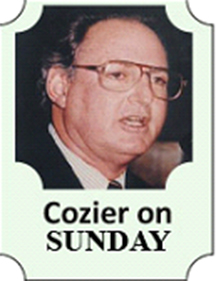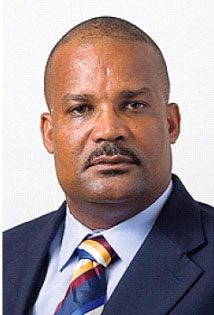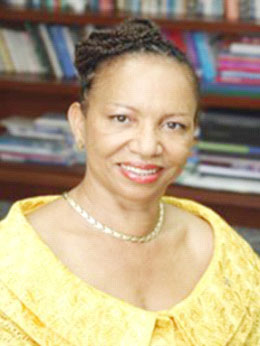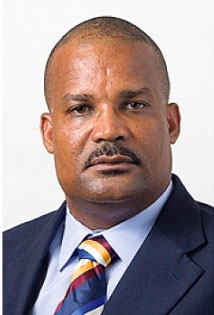EMMANUEL NANTHAN just doesn’t get it.
In an interview with experienced Guyanese cricket writer Sean Devers last week, the vice-president of the West Indies Cricket Board (WICB) reminded us that ‘only the shareholders’ (the individual boards of Barbados, Guyana, Jamaica, the Leeward Islands, Trinidad and Tobago and the Windward Islands) can dissolve the company WICB Inc., registered in the British Virgin Islands. He added that only they could appoint new directors, whether independent or their own.
That is precisely the point.
The composition of the WICB is well known. There are 12 shareholder directors, two for each affiliate, under president Dave Cameron and Nanthan or, to accord him his full title as carried on the WICB website, vice-president Hon. Ambassador Emmanuel Nanthan. There are also four ‘non-member’ directors, one a Caricom nominee.
 It is a long-standing arrangement that each of the three committees to review the board’s governance over the past eight years advised urgent changes. The reports of the committees headed by former Jamaica prime minister P.J.Patterson and St. Kitts and Nevis Queen’s Counsel, Charles Wilkin, called for a complete overhaul that would sharply reduce the number of directors and introduce independents.
It is a long-standing arrangement that each of the three committees to review the board’s governance over the past eight years advised urgent changes. The reports of the committees headed by former Jamaica prime minister P.J.Patterson and St. Kitts and Nevis Queen’s Counsel, Charles Wilkin, called for a complete overhaul that would sharply reduce the number of directors and introduce independents.
The most recent, brokered by Caricom’s sub-committee on cricket and headed by University of the West Indies (UWI) administrator, Dr. Eudine Barriteau, was presented in early November. It went further.
It declared that the status of West Indies cricket, once the envy of the world, had become so dire the WICB should be immediately dissolved, its members resign and a new, restructured board selected. Its concern is strengthened by results on the current tour of Australia. The report has the governments’ full support.
The WICB’s resistance was as predictable as Nanthan’s bitter charge that it was undertaken by ‘some Caricom governments and their academic functionaries’, as he put in in the Devers interview.
He accused governments of not supporting cricket in schools, clearly unaware that the greats of West Indies’ cricket, from Headley to Sobers to Lara, needed no government funding to make them the players they became; the development of their vast talent came mainly through grounding at clubs; since the 1960s, this has been augmented by the several state-appointed sports councils that provide coaches for schools.

Instead, the Honourable Ambassador sought to place the WICB’s shortcomings at the feet of governments. Yes, it’s always someone else’s fault.
Presumably pulling the figure out of a hat, he claimed it cost the WICB U$1 million for training a player from under-15 to international level. If so, he might ask whose fault is it that so few have reached that standard over the past two decades while there has been a stream out of other countries – Joe Root of England, Steve Smith of Australia, Virat Kohli of India and Kane Williamson out of New Zealand.
The WICB’s approach is in direct contrast to the openness of Cricket Australia (CA) and Cricket New Zealand (CNZ) when confronted by comparable proposals for changes to their constitutions and their structures.
Australia, perennially a powerhouse of the international game, commissioned two independent assessors four years ago to review its board’s governance. It put the advice of the Crawford-Carter report into train, replacing state delegates with independent directors, not necessarily with strong cricket connections. It was a radical change, now generally regarded as a success.
Two years later, New Zealand’s provincial associations unanimously approved a change to their board’s constitution, reducing its number of directors to eight, all independent. Since then, they have shot up from among the also-rans in the ICC rankings to mid-table; they are now a genuinely competitive force.
In spite of this evidence, the WICB rebuffed the main conclusion of the Patterson and Wilkin reports and, as is clear from Nanthan’s defiant statements, are preparing for a head-to-head fight with the governments over Barriteau’s.

Wilkin alluded to purely selfish reasons for the fact that his report went the way of Patterson’s; it was simply that the directors wanted to keep their positions ‘at all costs’.
Cricket Australia (CA) chief executive James Sutherland said during their present struggles in Australia that the plight ‘is ultimately an issue for themselves’.
Yet he did emphasise the effect on Australian cricket when it did its own governance review.
At a pre-match media conference in Melbourne prior to the Boxing Day Test on Saturday, head coach Phil Simmons restated his frustration of not having all the leading players available for selection and implored the WICB follow Cricket New Zealand’s ‘pragmatic approach’ that accommodates their players engaged in T20 overseas leagues without having to miss cricket for the national team.
Over the past three years, as the West Indies remained stationary, the Black Caps have become an attractive, genuinely competitive team in all forms of the game.

It is difficult to understand how Simmons’ grievances can be allayed at present. Of those receiving the media and public attention in Australia while the West Indies team is being chastised for its performances, all but Chris Gayle have retired from Tests and first-class cricket.
Gayle’s age (35) and fragile back make it unlikely that he can return. Pollard, injured at the moment, continues to declare his desire to play Tests but is only chosen for the shortest format.
Yet T20s will not go away.
While WICB chief executive Michael Muirhead urged ‘top players’ to be available for 2016 regional tournaments ‘to ensure they remain eligible for selection for international competition’, more are signing on for T20s elsewhere. Others are certain to follow, diminishing the strength of regional teams even further.
The Trinidad and Tobago pair, Rayad Emrit and Evan Lewis, a promising, attacking left-handed opener, turned out in the Bangladesh Premier League, November 22-December 15, missing four rounds of the PCL. Emrit was dropped as team captain as a result.
Test and ODI captain Jason Holder is one of eight West Indians signed on for the new Pakistan tournament in early February; it presents the WICB with a dilemma. He will be back from the Test series in Australia too late to play for Barbados in all its Nagico Super50 matches and in time only for the late matches of the PCL.
It is a problem affecting West Indies that can only become greater the more promising players are lured away from T20s. The WICB needs to tackle it by considering how New Zealand’s ‘pragmatic approach’ achieved it, except that, as Nanthan confirmed last week, it is known more for its intransigence than its pragmatism.










